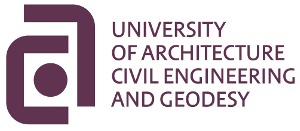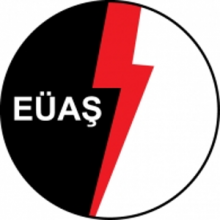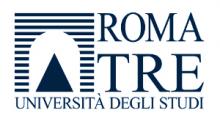University of Architecture, Civil Engineering and Geodesy

The University of Architecture, Civil Engineering and Geodesy (UACEG), Sofia, is the oldest and one of the most prestigious higher technical schools in Bulgaria. Founded in 1942 as a Higher Technical School, it was transformed into a State Polytechnic in 1945. In 1953 the Polytechnic was divided into several institutes, one of them being the Institute of Civil Engineering. In 1990, by a decision of its General Assembly, the Institute was renamed University of Architecture, Civil Engineering and Geodesy (UACEG) and official accreditation by Parliament followed in 1995.
The UACEG has nowadays an academic staff of 364, including 25 professors, 147 associate professors, 168 assistant professors, 24 lecturers working in its 4 faculties of Architecture, Structural Engineering, Hydraulic Engineering, Transport Engineering and Geodesy. For the 75 years of its existence the University has educated more than 5700 architects and 25,000 engineers.
The university campus is located close to the historic centre of Sofia and is nowadays conveniently accessible through public transport. It comprises 7 buildings with altogether 90 auditoriums, 36 laboratories, a well-equipped specialized library, 3 sports halls, a modern recreation centre and an Aula Maxima of 800 seats.
The UACEG has participated in numerous EU-funded programmes and projects, amongst them INTERREG IIIB CADSES: RIMED (Regional Integration and Metropolitan Development in SEE) PHARE CADSES: Floodmed project (2006-08.): FP5: INNOCONS project (2002-05), PETUS project (2002-2005); FP6: AquaStress project (2005-09); FP7: HYLOW project (2008-12).
The Department of Urban Planning at the UACEG was founded in 1945. A number of outstanding urban planners and academics, educated in Germany, France, Austria and Russia, contributed to the establishment and development of the Bulgarian planning school.
The Department has an abundant experience in education, research, practice and consultancy in the fields of urban, regional and landscape planning. It is nowadays one of the eight departments at the Faculty of Architecture with an academic staff of 15 people - architects, planners and an economist (1 professor, 5 associate professors and 9 assistant professors). A lot of researchers and leading practitioners from the country and abroad are also involved as guest lecturers in the teaching process. The Department has a leading role in the BSc and MSc Programmes in Urbanism, established in 2002 and 2006, covering the areas of urban planning and urban design, park and landscape architecture, regional planning, management in urban planning and architecture, sociology of architecture, ecology, etc. The Department is also responsible for the training of undergraduate and graduate students from the Master’s Programme in Architecture and of undergraduate students in Geodesy.
The Department provides supervision for PhD students from Bulgaria and abroad. Students from all over the world (Syria, Iraq, Algeria, Yemen, Ecuador, Germany, Russia, Poland, Macedonia, Algeria, etc.) have developed and successfully defended their PhD theses in the field of architecture, spatial development and planning under the supervision of the Department academic staff.
The Department has actively taken the chance for closer international professional contacts provided by the new societal context in the country since 1990 and has established broad international and interdisciplinary dialogue and collaboration in the field of spatial development and planning. The research mobility of PhD students and teachers from the Department within AUSMIP+ project (ERASMUS-MUNDUS programme of the EU, 2012-2016) provided an opportunity for exchange of experience with leading universities from Japan, Korea, Australia and New Zealand. The Department of Urban Planning is a collective member of international organizations and networks such as AESOP (associate membership since 1992, full membership since 2007), ATLAS (since 1994) and SPA-CE.net (since 2006).
The Department is active in international and EU research collaboration. EU research programmes has resulted from participation in FP5 - PETUS research project, Practical Evaluation Tools for Urban Sustainability, 2002-2005, 8 partner institutions; INTERREG III CADSES programme - RIMED project, Regional Integration and Metropolitan Development in South-Eastern Europe; a network of 12 partner institutions and organisations; etc. Staff members of the Department and PhD students have been involved in the COST Programme: Action C20 - The Urban Knowledge Arena, 2005-09; Action TU1104 - Smart Energy Regions, 2012-2016, Action TD1408 - Interdisciplinarity in Research Programming and Funding Cycles, 2015-continuig.
A continuing research interest is focused on the spatial and planning transformations at the urban and regional level in the country as a result of the ongoing societal transformations in South-Eastern Europe. We keep an explicit accent on the border research areas between spatial and social studies. Our ongoing University research project explores the effectiveness of spatial planning instruments in Bulgaria and is aimed at developing a relevant evaluation system. Our three recent university research projects comprise:
•Optimization of the exert capacity for spatial planning in Bulgaria (2014-2015);
•Application of open-source GIS in Bulgarian spatial planning (2013-2014),
•Modeling of demand responsive transport systems in the sparsely populated regions of Bulgaria (2010-2011);
The energy topic with its contextual embeddedness and its spatial implications for economic efficiency, environmental protection and social justice, is integrated in all our research and teaching on the built environment and on mobility as we believe it provides the basis for better understanding and improving the world we live in.
















